

How to Turn Compliant Learners into Engaged Learners - Learning Personalized. As a full-time education consultant, Allison Zmuda works with educators to grow ideas on how to make learning for students challenging, possible and worthy of the attempt.
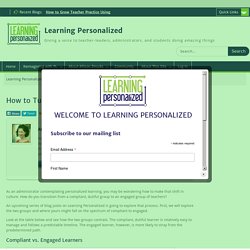
Over the past fifteen years, Zmuda has shared curricular, assessment, and instructional ideas, shown illustrative examples, and offered practical strategies of how to get started. Make Learning a Lifelong Habit. On Flipboard. If You Do Any of These 4 Activities in Your Classroom, You're Already Personalizing Learning. Decoding the Buzzwords "Personalized Learning" A MiddleWeb Blog Because I read a lot of educational publications, I am fluent in jargon and buzzwords.
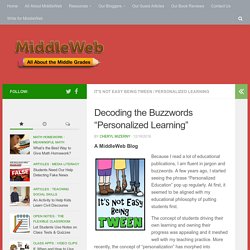
A few years ago, I started seeing the phrase “Personalized Education” pop up regularly. At first, it seemed to be aligned with my educational philosophy of putting students first. The concept of students driving their own learning and owning their progress was appealing and it meshed well with my teaching practice. More recently, the concept of “personalization” has morphed into something that gives me pause. The Golden Age of Teaching Yourself Anything. Illustration by Kyle Platts Who can resist the romanticism of self-taught achievers?
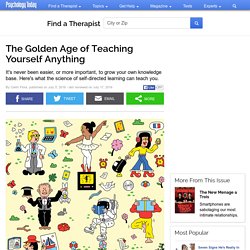
They didn't need school. They didn't need "the system. " They needed only their passion and their talent to propel themselves to grandeur. Bill Gates, college dropout turned billionaire techie and world saver, is the modern apotheosis of the autodidact. 5 Tools And Strategies That Support Personalized Learning. 5 Tools And Strategies That Support Personalized Learning by TeachThought Staff.
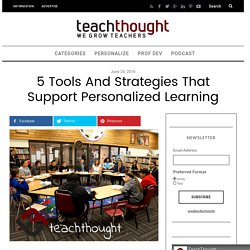
Edsurge. Thursday, May 26, 2016 A couple of years ago, Benjamin Riley kicked up a fuss with a blog post provocatively titled “Don’t Personalize Learning.”
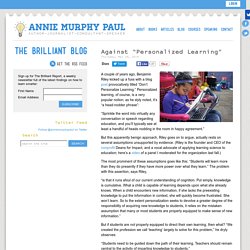
Personalized learning, of course, is a very popular notion; as he slyly noted, it’s “a head-nodder phrase”: “Sprinkle the word into virtually any conversation or speech regarding education, and you’ll typically see at least a handful of heads nodding in the room in happy agreement.” But this apparently benign approach, Riley goes on to argue, actually rests on several assumptions unsupported by evidence. The Inconvenient Truth About Personalized Learning. Personalized learning is quickly gaining steam among educators, philanthropists, and policymakers.
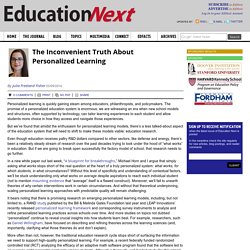
The promise of a personalized education system is enormous: we are witnessing an era when new school models and structures, often supported by technology, can tailor learning experiences to each student and allow students more choice in how they access and navigate those experiences. But we’ve found that amidst the enthusiasm for personalized learning models, there’s a less talked-about aspect of the education system that will need to shift to make these models viable: education research. Even though education receives paltry R&D dollars compared to other sectors, like defense and energy, there’s been a relatively steady stream of research over the past decades trying to look under the hood of “what works” in education. But if we are going to break open successfully the factory model of school, that research needs to go further. Click to enlarge. Stop Trying to Define Personalized Learning.
No.
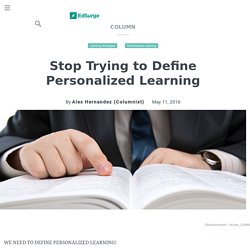
No we don’t. While personalized learning (PL) may be a “thing,” it is not a thing. As of today, PL is a set of loosely-related (sometimes completely unrelated) hypotheses. Educators, families and funders are testing to see if we can do better than the traditional classroom model of putting 20-30 similarly-aged students in a room with one adult for about an hour. The Battle for "Personalized Learning" -e-Literate. So here we go again.
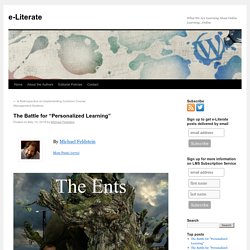
Another terminology war. First there was the battle for open. Then the battle for MOOCs. Somewhere in there was the battle for edupunk. I stay out of terminology wars because, even though they are often about very real and important issues, the emphasis on finding a single correct definition tends to distract rather than focus the conversation. Providing Transformative Personalized Student Learning Opportunities as a Path Toward Equity. Providing Transformative Personalized Student Learning Opportunities as a Path Toward Equity Promoting equity and excellence at every level of education to ensure that every child has the opportunity to succeed is one of U.S.
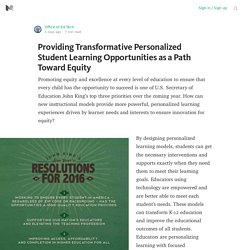
Secretary of Education John King’s top three priorities over the coming year. How can new instructional models provide more powerful, personalized learning experiences driven by learner needs and interests to ensure innovation for equity? Gamification, personalization and continued education are trending in edtech. I’ve spent most of my life in and around schools.
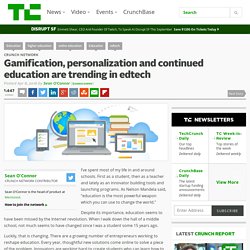
First as a student, then as a teacher and lately as an innovator building tools and launching programs. As Nelson Mandela said, “education is the most powerful weapon which you can use to change the world.” Despite its importance, education seems to have been missed by the Internet revolution. When I walk down the hall of a middle school, not much seems to have changed since I was a student some 15 years ago. Luckily, that is changing. There are only 11 education-focused firms listed on the U.S. stock market with a market cap of over $1 billion. Gamification, personalization and continued education are trending in edtech. Step by Step: Designing Personalized Learning Experiences For Students. The phrase “personalized learning” gets tossed around a lot in education circles.
Sometimes it’s used in the context of educational technology tools that offer lessons keyed to the academic level of individual students. Other times it’s referring to the personal touch of a teacher getting to know a student, learning about their interests and tailoring lessons to meet both their needs and their passion areas. As with most education jargon, the phrase isn’t fixed, but it usually connects to the idea that not all students need the same thing at the same time. It implies choice, multiple pathways to learning, many ways to demonstrate competency and resists the notion that all students learn the same way. Educator Mia MacMeekin has put together a clear infographic highlighting some of the ways teachers design “personalized” curriculum.
Personalized Learning — The Synapse. Personalized Learning Making the Paradigm Shift In his latest book, author and academic, Yong Zhao articulates a challenge that is facing many schools today. Most Popular of 2015, No. eight: 7 steps to creating PLCs teachers want to use. Practical tips for building PLCs that serve every educator Ed. note: We’re counting down the top stories of 2015 based on popularity (i.e. website traffic) to No. 1 on Dec. 31. Today we revisit our in-depth look at how to set up your own professional learning communities, which truly serve educators’ needs.
It was published as part of Innovation In Action, a column from the International Society of Technology in Education focused on exemplary practices in education that runs the third Monday of each month. At my district, the MSD of Wayne Township in Indianapolis, we have found that changing the way we think about teacher training not only benefits staff developers and administrators, but schools, the district as a whole, teachers, and ultimately students.
A critical part of our revitalized PD plan has been the use of professional learning communities (PLCs), which are essentially groups of educators that work collaboratively and share ideas, often in an online format. Ten Trends to Personalize Learning in 2015. About ETR Community EdTechReview (ETR) is a community of and for everyone involved in education technology to connect and collaborate both online and offline to discover, learn, utilize and share about the best ways technology can improve learning, teaching, and leading in the 21st century. EdTechReview spreads awareness on education technology and its role in 21st century education through best research and practices of using technology in education, and by facilitating events, training, professional development, and consultation in its adoption and implementation. Here's why Mark Zuckerberg is dumping billions into 'personalized learning'
Facebook founder Mark Zuckerberg believes personalised learning is the answer to many of education’s current woes, and is one of the four key areas that he and his wife Prescilla Chan’s US$45 billion Chan Zuckerberg Initiative will fund. While some argue whether this is a philanthropic act or a shrewd business strategy, others will ask: what is personalised learning anyway?
Because despite some politicians' enthusiastic endorsements of personalised education, there’s still no clear definition. Many in education would argue that personalised learning is what all good teachers do as a matter of course – modifying learning materials and teaching styles to accommodate the different ways pupils learn. Others see it as an antidote to top-down, centralised school bureaucracy, with the term “personalised” used interchangeably with individual, learner-centered or customised. Using Ed-Tech for Personalized, Adaptive, and Differentiated Learning - The Startup Blog: Ed Tech From the Ground Up. By guest blogger Sidharth Kakkar, co-founder and CEO of Front Row Education, Inc. 3 Personalization Myths. Personalization is all-the-rage across the country, and it's no small wonder. Technical Challenges on the Path to Personalization. CBAM: Stages of Concern about Personalized Learning. Personalized Learning Changes: Effect on instructors and coaches -e-Literate.
Kate Bowles left an interesting comment at my previous post about an ASU episode on e-Literate TV, where I argued that there is a profound change in the instructor role. Her comment: Phil, I’m interested to know if you found anything out about the pay rates for coaches v TAs. I’m also interested in what coaches were actually paid to do — how the parameters of their employable hours fit what they ended up doing.
Education Week. Updated Personalization vs. Differentiation vs. Individualization Chart Version 3. Personalization v Differentiation v Individualization (PDI) Chart (Version 3) The PDI chart was created for a reason: to clarify the differences in these terms. In 2010, the National Ed Tech Plan defined all three of these terms as they are related to instruction. We needed to emphasize the differences: Personalization is learner-centered. The other two, Differentiation and Individualization are teacher-centered.
Personalizing learning through the power of technology. We live in an exciting time. Technology is being integrated into every facet of our life, including the classroom, and it is unlocking the world for our students, teachers and families. While there may never be universal agreement on how we educate our future leaders, we all know that we cannot keep doing the same things and expect better results. Early Childhood Blogs. Personalizing learning through the power of technology. TEPLS_report-FINAL-051415. TEPLS_report-FINAL-051415. A Brave New World for "Personalized Learning"? Posted by Bill Ferriter on Thursday, 04/09/2015.
Learning in a Connected World. I have recently joined the open section of #MSLOC 430 - a graduate course in the Master's Program in Learning and Organizational Change at Northwestern University. This is the first week and I am absolutely looking forward to exploring the topics, learning from the other participants and participating in exciting conversations.
10 Trends to Personalize Learning in 2015. 2015 is the year the focus will finally turn the corner by organizations in education and the business world to get it right: it is about the learner. We don't care enough to give you constructive feedback. A Beginner's Guide To Personalized Learning -